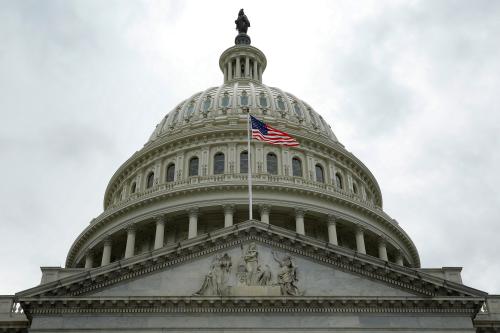The American Health Care Act (AHCA) is now in the Senate’s hands, and the stakes of these negotiations are sky-high. A key part of House Republicans’ efforts to resurrect and pass the measure was an amendment offered by Rep. Tom MacArthur (R-N.J.) that would allow states to request a waiver from a number of requirements originally created by the Affordable Care Act (ACA) in 2010.
The amendment would give states the chance to opt out of the ACA’s prohibition on charging different premiums to individuals purchasing coverage in the same area and its requirement that individual plans cover a core set of essential health benefits. These provisions are key components of the ACA’s basic structure, and if the amendment were signed into law, they could have significant negative effects on beneficiaries, especially those with pre-existing conditions.
On one hand, the MacArthur Amendment seems like an ordinary example of regular congressional deal-making. Two groups of members opposed the March version of the health care legislation: the formally-organized House Freedom Caucus and a looser collection of legislators we might call the Coverage Caucus. To bring enough of these members on board to pass the bill, MacArthur and Freedom Caucus chair Mark Meadows (R-N.C.) devised the supplemental language. In two important ways, however, the MacArthur Amendment departs from our expectations about how members of Congress generally, and health care waivers specifically, work.
By giving states the ability to opt-out of particular requirements established in federal law, we can think of the MacArthur Amendment as a specific example of what political scientists call delegation, or the decision by Congress to give some other actor the authority to make certain choices rather than retaining that responsibility for themselves. As Pamela Clouser McCann documents, states are a frequent recipient of power from Congress, and we should expect individual members to make choices about whether to delegate to the states based on their expectations about the consequent policy outcomes. Under this logic, when Republicans control the House, Senate, and presidency, Republican House members from states with Democratic governors will be concerned about decentralizing power, since, in their states, they will be handing it over to the opposing party.
For some of the Republicans who opposed the AHCA, this reasoning may help explain their vote; of the 20 GOP “no” votes, 11 are from states with Democratic governors, and three are from New Jersey, where a Democrat leads the polls in this fall’s gubernatorial race. At the same time, a number of Republican members supported the bill despite the fact that it would essentially delegate this decision to governors in the opposing party. Of the 41 members identified by the New York Times as potential “no” votes, 21 eventually voted “yes.” Nine of these members (California Representatives Ken Calvert, Jeff Denham, Darrell Issa, Steve Knight, Doug LaMalfa, Ed Royce, and David Valadao, plus Rep. Claudia Tenney of New York and Rep. Erik Paulsen of Minnesota) are from states with Democratic governors, and a tenth (Rep. Rodney Frelinghuysen) is from New Jersey.
Why did these legislators behave contrary to expectations? One possibility is that they oppose the policy changes the MacArthur Amendment would usher in, but believe that their governors would not actually seek the waivers. Indeed, some Republicans offered this reasoning as justification for supporting the bill, but experts have argued that even governors in solidly Democratic states may find themselves pressured to seek waivers. A second option is that any concerns about policy consequences (or lack thereof) were outweighed by the political desire to have others begin to shoulder the responsibility of changing the law. By finally getting the bill out of the House, Republicans would force their Senate colleagues to share the public pressure both for and against action. And if the AHCA is ultimately enacted into law and Democratic governors do pursue waivers to unpopular effects, this may shift some of the blame from House Republicans who voted for the bill to Democratic governors who sought waivers.
Further, the MacArthur Amendment is not just unusual because it contradicts our expectations about congressional behavior. It is also different from other legislative provisions that allow for waivers from federal requirements in health care policy. Consider Section 1115 of the Social Security Act Amendments of 1962, which provides governors with opportunities to apply for flexibility from federal law in order to experiment with new programs in Medicaid and welfare. President Kennedy described the motivation for this provision: “No study of the public welfare program can fail to note the difficulty of the problems faced or the need to be imaginative in dealing with them. Accordingly, I recommend that amendments be made to encourage experimental, pilot, or demonstration projects that would promote the objectives of the assistance titles and help make our welfare programs more flexible and adaptable to local needs.”
While presidents have since requested and approved waivers in the service of meeting their own policy goals, Congress did not adopt Section 1115 to achieve a specific policy objective, but rather, to facilitate state-level policy innovation. In contrast, the MacArthur Amendment appears to be narrowly tailored to satisfy at least the political, if not the policy, aims of particular members of Congress.
Focused waiver provisions are not, however, unheard of. In 1981, Congress included Section 1915 in the Omnibus Budget Reconciliation Act to allow for Medicaid waivers designed to meet a specific purpose. As Frank Thompson and Courtney Burke explain, Section 1915c allowed states to apply for waivers that made it easier for states to offer Medicaid recipients home and community-based services (HCBS).
While the MacArthur Amendment follows Section 1915c’s precedent as a narrowly tailored waiver provision to encourage certain types of state-level policy change, the two are also different in important ways. As Thompson chronicles, organizations representing individuals with disabilities generally advocate in favor of expanding HCBS. In contrast, a constellation of interest groups spoke out vociferously against the AHCA and the MacArthur Amendment precisely because of the impact these waivers could have on vulnerable individuals.
Further, Thompson and Burke find that “[s]tates moved quickly to take advantage of the new waiver authority” under Section 1915c. This reaction suggests that the flexibility available under this waiver authority allowed governors to pursue programs that comported with their policy goals (and, relatedly, their own re-election prospects). In contrast, the flexibility offered under the MacArthur Amendment could be more of a liability than a benefit for some governors. Ultimately, the MacArthur Amendment appears distinct in that it offers governors flexibility to implement a specific policy change that lacks popular support from Democratic and Republican voters alike and simultaneously faces a wide variety of detractors among powerful healthcare and health industry groups.
Now that the bill is in the Senate’s hands, the MacArthur Amendment may be jettisoned for policy or procedural reasons. Some Republican senators may object to the changes it makes, and the Senate parliamentarian may advise that it runs afoul of the Byrd Rule, which restricts the content of fast-track budget reconciliation bills like the AHCA. If the provision, or something like it, remains, however, it will stand as a relatively atypical legislative provision in the context of both congressional strategy and health care politics.











Commentary
The AHCA’s MacArthur Amendment: Unusual politics, unusual policy
May 12, 2017